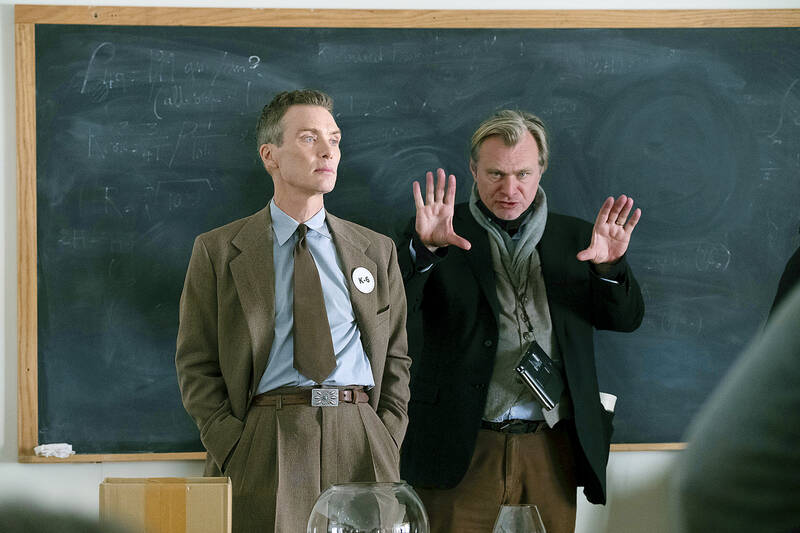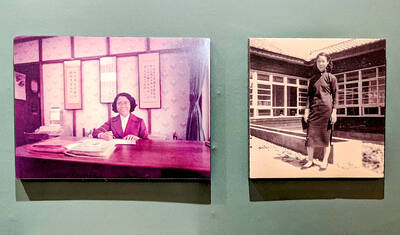The story of the invention of the atomic bomb told in the new film Oppenheimer is a “warning” to the world as we grapple with artificial intelligence, insists the movie’s director Christopher Nolan.
The British-born maker of Memento, Dunkirk and the Batman trilogy said he believes a lot of the anguish around technology “in our imagination stems from (Robert) Oppenheimer,” the physicist who helped invent nuclear weapons during World War II.
What he and his team at the Los Alamos Laboratory in the US did was “the ultimate expression of science... which is such a positive thing, having the ultimate negative consequences,” Nolan said.

Photo: AP
Like back then, the startling advances in artificial intelligence (AI) are raising similar fears about the dangers of a technology with potentially uncontrollable consequences.
Some worry that AI could escape its creators and endanger humanity, much like scientists and others fretted eight decades ago with the dawn of the nuclear age.
“That was a moment in history. This is one too,” Nolan’s star Cillian Murphy — who plays the haunted scientist — said while the pair were in Paris to promote the film, which opens across the globe and Taiwan this weekend.
“Artificial intelligence researchers refer to the present moment as an ‘Oppenheimer moment,’” said Nolan, referring to the first atomic tests, when some feared nuclear fission would lead to an uncontrolled chain reaction that would pulverize the entire planet. Those now working on AI “look at his story for some guidance as to what is their responsibility — as to what they should be doing.”
“But I don’t think it offers any easy answers. It is a cautionary tale. It shows the dangers.”
“The emergence of new technologies is quite often accompanied by a sense of dread about where that might lead,” he said.
DILEMMA
Nolan’s drama turns on the dilemma this posed for the scientists working on the Manhattan Project, the codename of the drive to develop the bombs that were later dropped on Hiroshima and Nagasaki.
“They had lived through World War I and they were trying to end World War II,” he said.
Oppenheimer argued in vain for international control of nuclear weapons, hoping it would lead to peace. The director said many would argue that “actually some stability in the world has been achieved through the existence of these weapons.
“Personally, I don’t find that reassuring, but it just goes to show there are absolutely no easy answers to the dilemma.”
The war in Ukraine has reawakened the threat of nuclear Armageddon raising tensions between the superpowers not seen since the end of the Cold War. Actor Matt Damon, who plays General Leslie Groves, the head of the Manhattan Project, said the last year has been a reality check that the danger of nuclear disaster is still very much there.
“How did I forget about this? It’s like the Cold War ended and my brain played a trick on me and said, ‘OK, let’s put that away, you don’t have to worry about that anymore’ — which is absurd.”
But as soon as Russia invaded Ukraine “suddenly overnight it became the most important thing for us all to think about again,” said the 52-year-old star.
Oppenheimer is facing off against Barbie in the biggest clash of Hollywood summer blockbusters, with both opening on the same day in a duel the media has dubbed “Barbenheimer.”

Following the shock complete failure of all the recall votes against Chinese Nationalist Party (KMT) lawmakers on July 26, pan-blue supporters and the Chinese Communist Party (CCP) were giddy with victory. A notable exception was KMT Chairman Eric Chu (朱立倫), who knew better. At a press conference on July 29, he bowed deeply in gratitude to the voters and said the recalls were “not about which party won or lost, but were a great victory for the Taiwanese voters.” The entire recall process was a disaster for both the KMT and the Democratic Progressive Party (DPP). The only bright spot for

Water management is one of the most powerful forces shaping modern Taiwan’s landscapes and politics. Many of Taiwan’s township and county boundaries are defined by watersheds. The current course of the mighty Jhuoshuei River (濁水溪) was largely established by Japanese embankment building during the 1918-1923 period. Taoyuan is dotted with ponds constructed by settlers from China during the Qing period. Countless local civic actions have been driven by opposition to water projects. Last week something like 2,600mm of rain fell on southern Taiwan in seven days, peaking at over 2,800mm in Duona (多納) in Kaohsiung’s Maolin District (茂林), according to

Aug. 11 to Aug. 17 Those who never heard of architect Hsiu Tse-lan (修澤蘭) must have seen her work — on the reverse of the NT$100 bill is the Yangmingshan Zhongshan Hall (陽明山中山樓). Then-president Chiang Kai-shek (蔣介石) reportedly hand-picked her for the job and gave her just 13 months to complete it in time for the centennial of Republic of China founder Sun Yat-sen’s birth on Nov. 12, 1966. Another landmark project is Garden City (花園新城) in New Taipei City’s Sindian District (新店) — Taiwan’s first mountainside planned community, which Hsiu initiated in 1968. She was involved in every stage, from selecting

As last month dawned, the Democratic Progressive Party (DPP) was in a good position. The recall campaigns had strong momentum, polling showed many Chinese Nationalist Party (KMT) lawmakers at risk of recall and even the KMT was bracing for losing seats while facing a tsunami of voter fraud investigations. Polling pointed to some of the recalls being a lock for victory. Though in most districts the majority was against recalling their lawmaker, among voters “definitely” planning to vote, there were double-digit margins in favor of recall in at least five districts, with three districts near or above 20 percent in